Wormwood oil
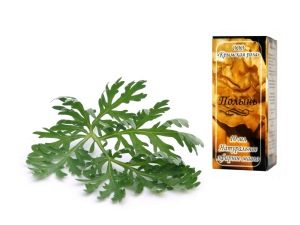
Sagebrush used to obtain wormwood oil. It has many healing properties, even in the period of Antiquity, ancient physicians used it for various purposes. Wormwood has about 400 species, half of which have already been studied by experts. Approximately 170 species of this plant grow in European countries. High quality oil can be obtained from each species.
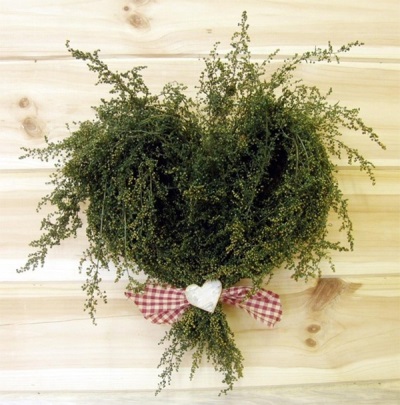
cooking oil
- Collect fresh grass, rinse and dry.
- The plant is placed in a glass container, olive oil is poured into it and tightly closed.
- Let it brew for 10 days.
- To determine the readiness of wormwood oil, you need to look at its color, because it should have a dark green or pearly hue.
- The oil is filtered to get rid of leaves and twigs.
- The finished oil is stored in a jar in a cold place.
- Wormwood oil is used externally for wounds, ulcers, or other skin problems.
Dried leaves and flowers of this plant are used to obtain essential wormwood oil. This oil is obtained through a steam distillation process.
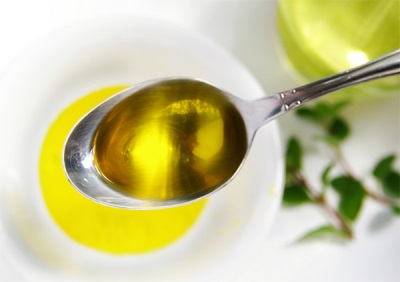
Kinds
- wormwood oil
- Wormwood oil
- Annual wormwood oil
- Indian wormwood oil
- Oil tarragon
- Artemisia oil
- Tauride or Crimean wormwood oil
- Lemon wormwood oil
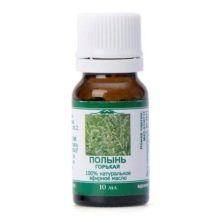
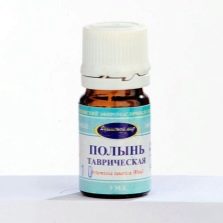
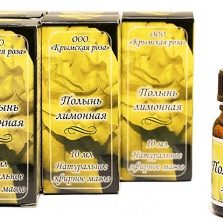
Chemical composition
Wormwood Tauride contains 0.5-1% essential oil, the components of which are thujone, cadinene, pinene and a number of other terpenes. Wormwood lemon contains 0.4–0.8% essential oil, where aldehydes and terpenes predominate.
Beneficial features
- Wormwood oil has an antiseptic effect on the body, so it is widely used for respiratory diseases.
- The essential oil is used as a pain reliever.
- Wormwood oil has a positive effect on the nervous system, because it relieves irritability, fights insomnia, treats neurosis, relieves fatigue.
- This oil is invaluable for the female body. It is used for various gynecological diseases, helps to restore the menstrual cycle.
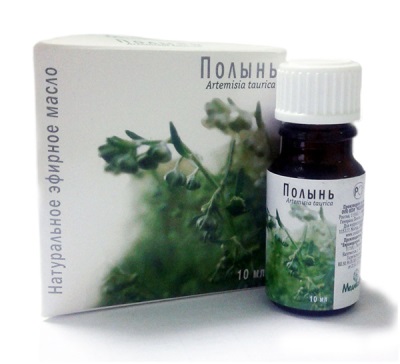
Harm
Wormwood oil is characterized by both positive and bad effects on the body, so you need to be careful when using it. Experts even prohibit the use of essential oils of certain types of wormwood on their own.
For example, wormwood oil contains a high concentration of thujote, which belongs to the group of ketones. This component is quite toxic for the human body, is characterized by a strong irritant effect and can cause abortion. This oil is generally not used in aromatherapy. Wormwood oil also contains thujone, but a popular strong drink, absinthe, is produced on its basis. Of course, for some time this alcohol was banned, because it was recognized as a drug. But today absinthe is legal and is very popular among the female half.
With prolonged use of wormwood oil, there are manifestations of dizziness, convulsions, nervous disorders, hallucinations, convulsions and spasms occur.
Contraindications
- patients with epilepsy;
- during pregnancy;
- with individual intolerance.
Wormwood oil is strictly forbidden to use during pregnancy. If used, then only one month with a two-month break between courses. If you increase the allowable dosage, it can cause a miscarriage.
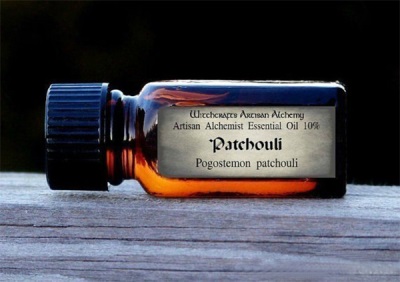
Application
In medicine
The essential oil of many varieties of wormwood has a wide range of properties:
- positively affects the functioning of the gastrointestinal tract;
- increases appetite;
- helps in the secretion of bile;
- increases the acidity of gastric juice;
- helps with diseases of the respiratory system, is used for influenza, treats bronchial asthma and bronchitis, provides relief from runny nose and cough;
- has a positive effect on rheumatism, arthritis or muscle pain;
- used in the treatment of nervous disorders or hysteria.
Wormwood oil for external use:
- with acne;
- with various fungal diseases;
- relieves inflammation on the skin;
- Helps eliminate bad breath from the mouth.
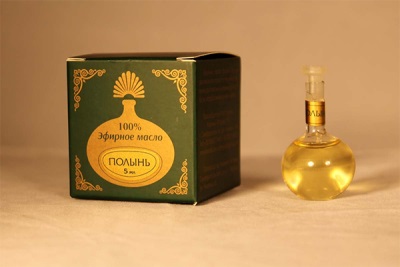
Wormwood oil can be extracted from almost every variety of this plant. Moreover, each oil is characterized by a special spectrum of action on the human body.
Oil of wormwood Tauride (Crimean)
- helps with heart pain, so it is a component of the pharmacological drug tauremizine, which excites the central nervous system and increases the heartbeat;
- for the treatment of purulent tonsillitis, it is enough to use 2-3 drops of oil on the tonsils. The course of treatment is 7 days;
- helps to remove harmful substances from the body;
- used for hemorrhoids or motion sickness;
- stimulates sexual activity.
Lemon
- it is characterized by a strong antimicrobial effect, therefore it is used for colds, gastrointestinal diseases; when applied externally, it is included in the course of treatment of purulent wounds or ulcers;
- fights germs that spread in the air;
- neutralizes the effect of alcoholic beverages;
- helps to cope with headaches;
- used for jaundice.
bitter
- beneficial effect on the gastrointestinal tract;
- used in liver diseases;
- helps to forget about worms;
- lowers body temperature;
- eliminates runny nose and cough;
- enhances hearing;
- helps to adapt to new climatic conditions;
- has a positive effect on the emotional state;
- increases mental performance;
- used for rejuvenation.

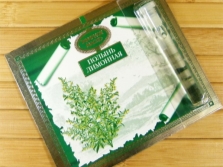
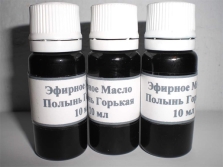
Essential oil should be taken 1-2 drops three times a day, after dissolving it in 1 teaspoon. a spoonful of honey.
In cosmetology
Wormwood essential oil is widely used in ready-made cosmetic products, because this plant has excellent antiseptic properties, and also has a characteristic smell that many people really like. To keep this smell, it is enough to use 2-3 drops of oil per 10 ml of cosmetic product. If you need to get rid of the smell, then 1 drop will be enough.
Oil from various types of wormwood is actively added to various creams for oily skin types, to nourishing masks for hair and scalp, and also to strengthen the nail plate. Wormwood essential oil is actively added to creams, gels, soaps and perfumes. Wormwood oil is one of the components of perfumery.
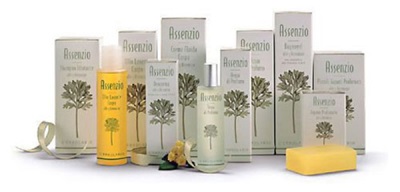
Traditional medicine recipes
- with vein expansion or thrombophlebitis - compresses are used, the filler of which is bran or yogurt, a few drops of oil are added and applied for half an hour to sore spots;
- with serious burns - you need to mix sea buckthorn and wormwood oil in equal proportions, and treat various wounds;
- for massage - apply 2 or 3 drops of oil per 10 ml of the main product;
- for application - up to 8 drops per 10 ml of the base agent are used;
- for taking baths - you need to dissolve two drops of Tauride oil in an emulsifier;
- to enrich ready-made cosmetics - 2-3 drops of Tauride oil per 10 ml are enough;
- for migraines or headaches - you need to mix three drops of lavender oil, lemon wormwood and mint and add 50 ml of water. Then moisten a cotton swab in this solution and wipe the temples, the back of the head and forehead.


















I sometimes use wormwood oil to increase stomach acidity. It helps me.
An infusion of wormwood in olive oil helps in the treatment of demodicosis of the face, but with the complete exclusion of sugar from the diet.